HC2121 Comparative Business Ethics: Analysis of Microsoft's AI Ethics
VerifiedAdded on 2023/06/12
|8
|2491
|171
Essay
AI Summary
This essay provides a comprehensive analysis of Microsoft's strategic plan, as outlined by CEO Satya Nadella, to enhance data privacy for its customers. It summarizes a news article focusing on Microsoft's commitment to building secure solutions and adhering to GDPR compliance amidst rising concerns about data breaches. The essay discusses key ethical issues such as consumer data privacy and the need for stronger regulations, including those related to artificial intelligence. It evaluates the appropriateness of Microsoft's ethical decisions, outlines the ethical decision-making process using moral philosophies, and concludes that these measures are likely to revive customer confidence and improve eCommerce interactions. The essay also touches on legal and sanction implications and the potential benefits of other organizations adopting similar strategies.
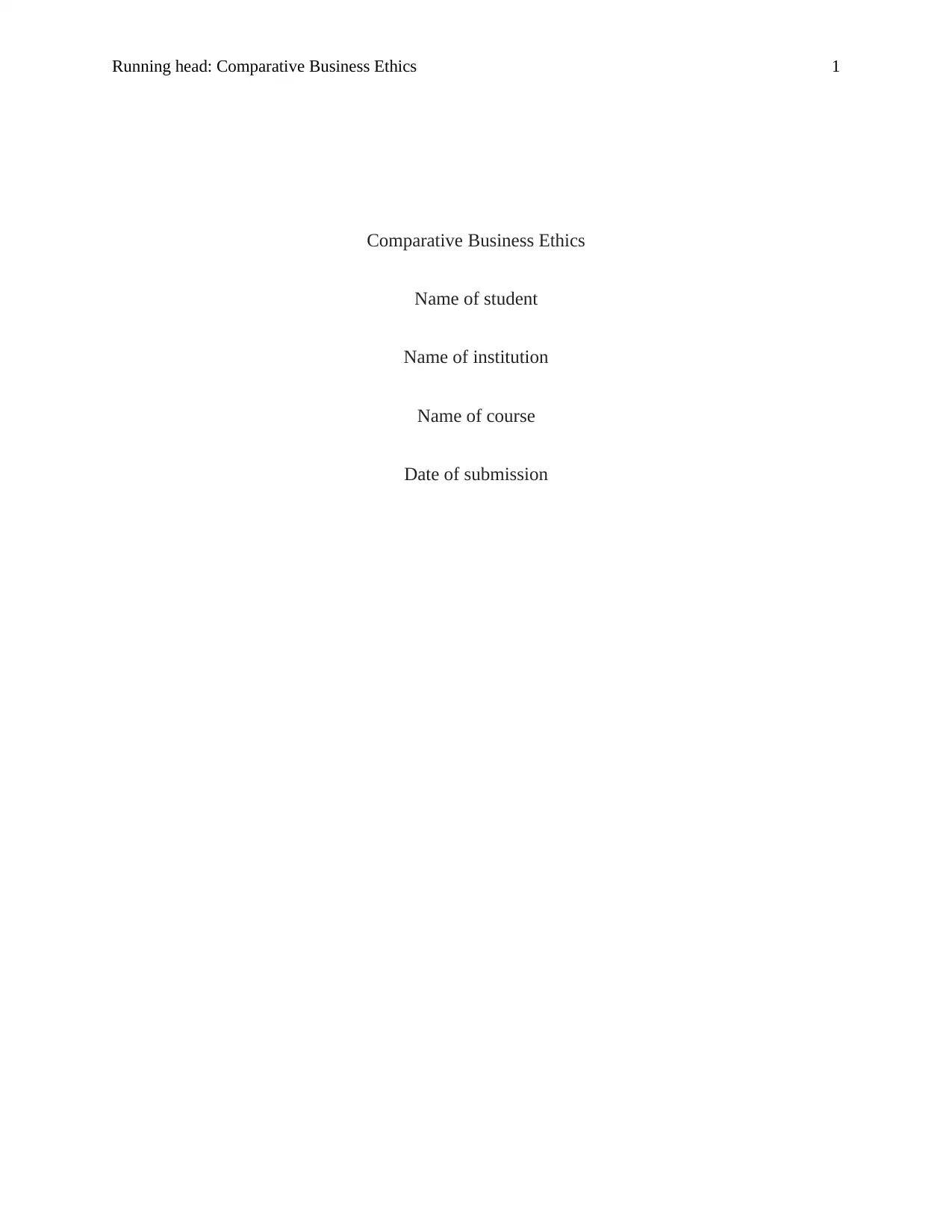
Running head: Comparative Business Ethics 1
Comparative Business Ethics
Name of student
Name of institution
Name of course
Date of submission
Comparative Business Ethics
Name of student
Name of institution
Name of course
Date of submission
Paraphrase This Document
Need a fresh take? Get an instant paraphrase of this document with our AI Paraphraser
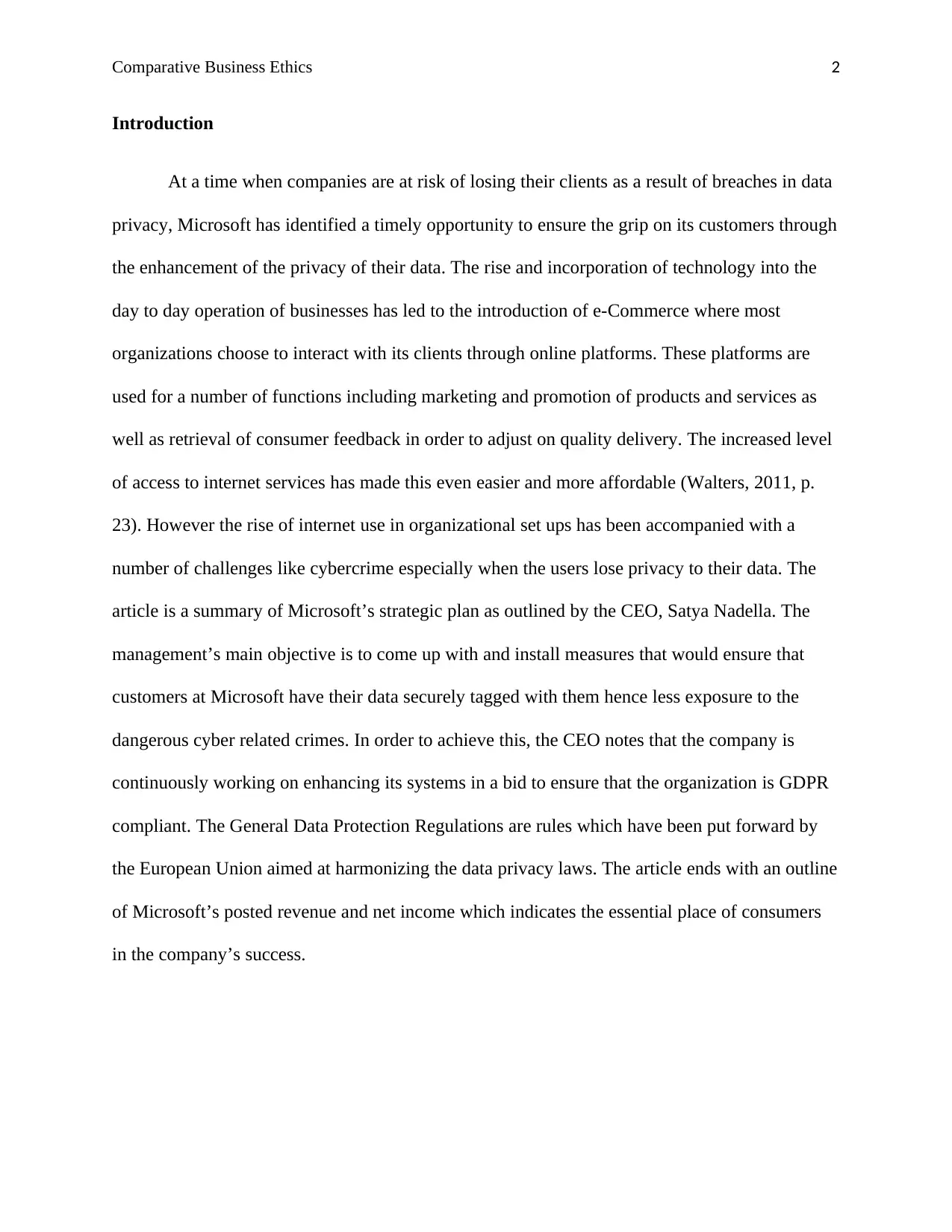
Comparative Business Ethics 2
Introduction
At a time when companies are at risk of losing their clients as a result of breaches in data
privacy, Microsoft has identified a timely opportunity to ensure the grip on its customers through
the enhancement of the privacy of their data. The rise and incorporation of technology into the
day to day operation of businesses has led to the introduction of e-Commerce where most
organizations choose to interact with its clients through online platforms. These platforms are
used for a number of functions including marketing and promotion of products and services as
well as retrieval of consumer feedback in order to adjust on quality delivery. The increased level
of access to internet services has made this even easier and more affordable (Walters, 2011, p.
23). However the rise of internet use in organizational set ups has been accompanied with a
number of challenges like cybercrime especially when the users lose privacy to their data. The
article is a summary of Microsoft’s strategic plan as outlined by the CEO, Satya Nadella. The
management’s main objective is to come up with and install measures that would ensure that
customers at Microsoft have their data securely tagged with them hence less exposure to the
dangerous cyber related crimes. In order to achieve this, the CEO notes that the company is
continuously working on enhancing its systems in a bid to ensure that the organization is GDPR
compliant. The General Data Protection Regulations are rules which have been put forward by
the European Union aimed at harmonizing the data privacy laws. The article ends with an outline
of Microsoft’s posted revenue and net income which indicates the essential place of consumers
in the company’s success.
Introduction
At a time when companies are at risk of losing their clients as a result of breaches in data
privacy, Microsoft has identified a timely opportunity to ensure the grip on its customers through
the enhancement of the privacy of their data. The rise and incorporation of technology into the
day to day operation of businesses has led to the introduction of e-Commerce where most
organizations choose to interact with its clients through online platforms. These platforms are
used for a number of functions including marketing and promotion of products and services as
well as retrieval of consumer feedback in order to adjust on quality delivery. The increased level
of access to internet services has made this even easier and more affordable (Walters, 2011, p.
23). However the rise of internet use in organizational set ups has been accompanied with a
number of challenges like cybercrime especially when the users lose privacy to their data. The
article is a summary of Microsoft’s strategic plan as outlined by the CEO, Satya Nadella. The
management’s main objective is to come up with and install measures that would ensure that
customers at Microsoft have their data securely tagged with them hence less exposure to the
dangerous cyber related crimes. In order to achieve this, the CEO notes that the company is
continuously working on enhancing its systems in a bid to ensure that the organization is GDPR
compliant. The General Data Protection Regulations are rules which have been put forward by
the European Union aimed at harmonizing the data privacy laws. The article ends with an outline
of Microsoft’s posted revenue and net income which indicates the essential place of consumers
in the company’s success.
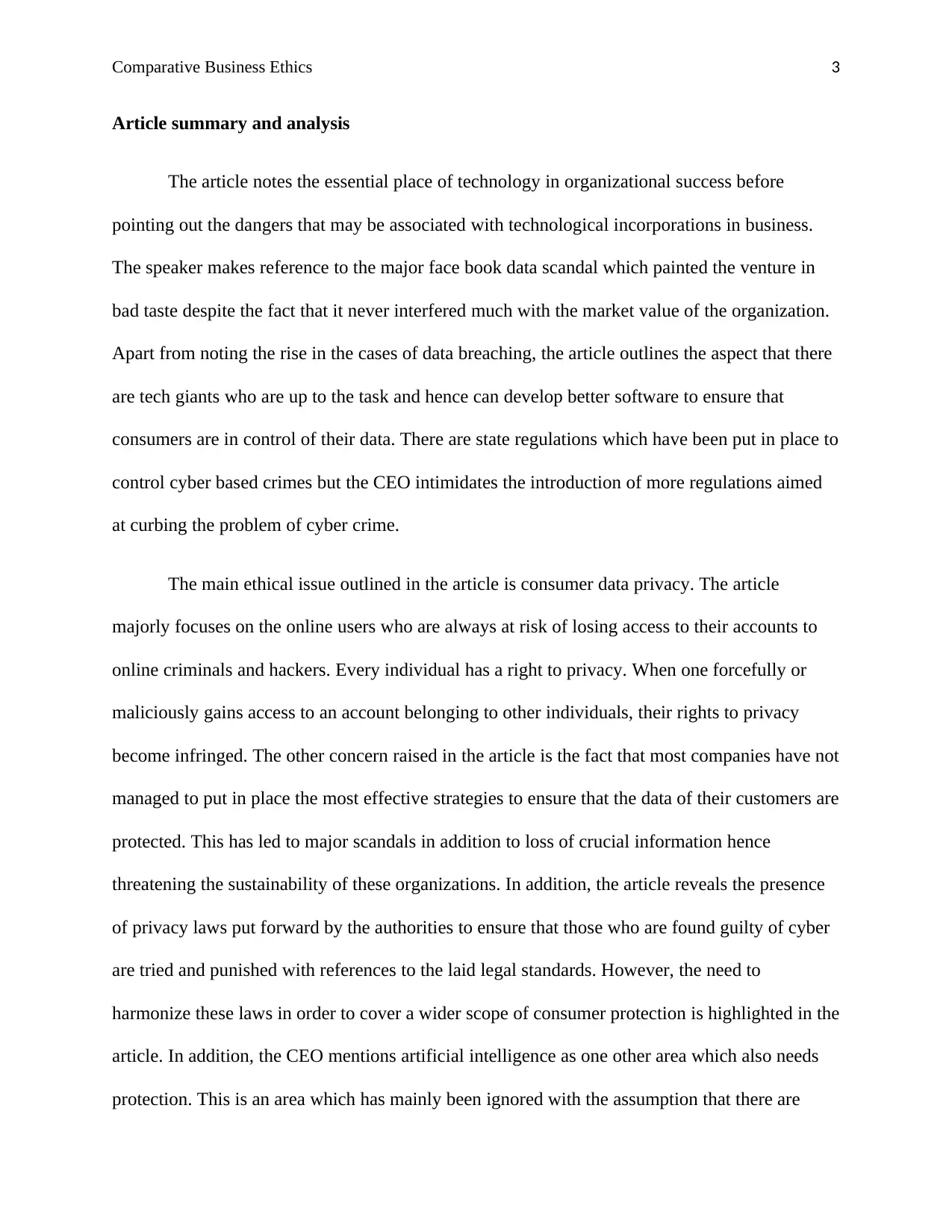
Comparative Business Ethics 3
Article summary and analysis
The article notes the essential place of technology in organizational success before
pointing out the dangers that may be associated with technological incorporations in business.
The speaker makes reference to the major face book data scandal which painted the venture in
bad taste despite the fact that it never interfered much with the market value of the organization.
Apart from noting the rise in the cases of data breaching, the article outlines the aspect that there
are tech giants who are up to the task and hence can develop better software to ensure that
consumers are in control of their data. There are state regulations which have been put in place to
control cyber based crimes but the CEO intimidates the introduction of more regulations aimed
at curbing the problem of cyber crime.
The main ethical issue outlined in the article is consumer data privacy. The article
majorly focuses on the online users who are always at risk of losing access to their accounts to
online criminals and hackers. Every individual has a right to privacy. When one forcefully or
maliciously gains access to an account belonging to other individuals, their rights to privacy
become infringed. The other concern raised in the article is the fact that most companies have not
managed to put in place the most effective strategies to ensure that the data of their customers are
protected. This has led to major scandals in addition to loss of crucial information hence
threatening the sustainability of these organizations. In addition, the article reveals the presence
of privacy laws put forward by the authorities to ensure that those who are found guilty of cyber
are tried and punished with references to the laid legal standards. However, the need to
harmonize these laws in order to cover a wider scope of consumer protection is highlighted in the
article. In addition, the CEO mentions artificial intelligence as one other area which also needs
protection. This is an area which has mainly been ignored with the assumption that there are
Article summary and analysis
The article notes the essential place of technology in organizational success before
pointing out the dangers that may be associated with technological incorporations in business.
The speaker makes reference to the major face book data scandal which painted the venture in
bad taste despite the fact that it never interfered much with the market value of the organization.
Apart from noting the rise in the cases of data breaching, the article outlines the aspect that there
are tech giants who are up to the task and hence can develop better software to ensure that
consumers are in control of their data. There are state regulations which have been put in place to
control cyber based crimes but the CEO intimidates the introduction of more regulations aimed
at curbing the problem of cyber crime.
The main ethical issue outlined in the article is consumer data privacy. The article
majorly focuses on the online users who are always at risk of losing access to their accounts to
online criminals and hackers. Every individual has a right to privacy. When one forcefully or
maliciously gains access to an account belonging to other individuals, their rights to privacy
become infringed. The other concern raised in the article is the fact that most companies have not
managed to put in place the most effective strategies to ensure that the data of their customers are
protected. This has led to major scandals in addition to loss of crucial information hence
threatening the sustainability of these organizations. In addition, the article reveals the presence
of privacy laws put forward by the authorities to ensure that those who are found guilty of cyber
are tried and punished with references to the laid legal standards. However, the need to
harmonize these laws in order to cover a wider scope of consumer protection is highlighted in the
article. In addition, the CEO mentions artificial intelligence as one other area which also needs
protection. This is an area which has mainly been ignored with the assumption that there are
⊘ This is a preview!⊘
Do you want full access?
Subscribe today to unlock all pages.

Trusted by 1+ million students worldwide
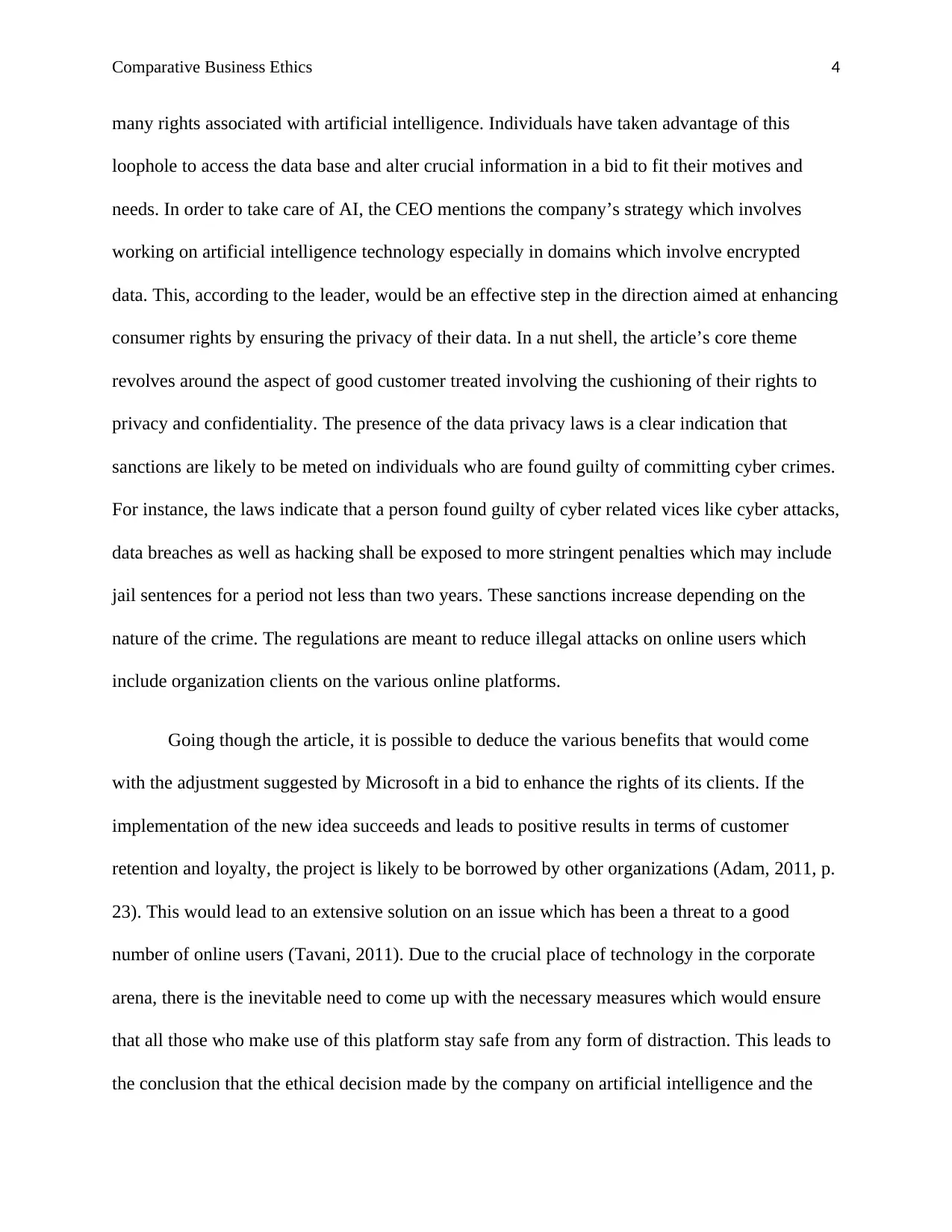
Comparative Business Ethics 4
many rights associated with artificial intelligence. Individuals have taken advantage of this
loophole to access the data base and alter crucial information in a bid to fit their motives and
needs. In order to take care of AI, the CEO mentions the company’s strategy which involves
working on artificial intelligence technology especially in domains which involve encrypted
data. This, according to the leader, would be an effective step in the direction aimed at enhancing
consumer rights by ensuring the privacy of their data. In a nut shell, the article’s core theme
revolves around the aspect of good customer treated involving the cushioning of their rights to
privacy and confidentiality. The presence of the data privacy laws is a clear indication that
sanctions are likely to be meted on individuals who are found guilty of committing cyber crimes.
For instance, the laws indicate that a person found guilty of cyber related vices like cyber attacks,
data breaches as well as hacking shall be exposed to more stringent penalties which may include
jail sentences for a period not less than two years. These sanctions increase depending on the
nature of the crime. The regulations are meant to reduce illegal attacks on online users which
include organization clients on the various online platforms.
Going though the article, it is possible to deduce the various benefits that would come
with the adjustment suggested by Microsoft in a bid to enhance the rights of its clients. If the
implementation of the new idea succeeds and leads to positive results in terms of customer
retention and loyalty, the project is likely to be borrowed by other organizations (Adam, 2011, p.
23). This would lead to an extensive solution on an issue which has been a threat to a good
number of online users (Tavani, 2011). Due to the crucial place of technology in the corporate
arena, there is the inevitable need to come up with the necessary measures which would ensure
that all those who make use of this platform stay safe from any form of distraction. This leads to
the conclusion that the ethical decision made by the company on artificial intelligence and the
many rights associated with artificial intelligence. Individuals have taken advantage of this
loophole to access the data base and alter crucial information in a bid to fit their motives and
needs. In order to take care of AI, the CEO mentions the company’s strategy which involves
working on artificial intelligence technology especially in domains which involve encrypted
data. This, according to the leader, would be an effective step in the direction aimed at enhancing
consumer rights by ensuring the privacy of their data. In a nut shell, the article’s core theme
revolves around the aspect of good customer treated involving the cushioning of their rights to
privacy and confidentiality. The presence of the data privacy laws is a clear indication that
sanctions are likely to be meted on individuals who are found guilty of committing cyber crimes.
For instance, the laws indicate that a person found guilty of cyber related vices like cyber attacks,
data breaches as well as hacking shall be exposed to more stringent penalties which may include
jail sentences for a period not less than two years. These sanctions increase depending on the
nature of the crime. The regulations are meant to reduce illegal attacks on online users which
include organization clients on the various online platforms.
Going though the article, it is possible to deduce the various benefits that would come
with the adjustment suggested by Microsoft in a bid to enhance the rights of its clients. If the
implementation of the new idea succeeds and leads to positive results in terms of customer
retention and loyalty, the project is likely to be borrowed by other organizations (Adam, 2011, p.
23). This would lead to an extensive solution on an issue which has been a threat to a good
number of online users (Tavani, 2011). Due to the crucial place of technology in the corporate
arena, there is the inevitable need to come up with the necessary measures which would ensure
that all those who make use of this platform stay safe from any form of distraction. This leads to
the conclusion that the ethical decision made by the company on artificial intelligence and the
Paraphrase This Document
Need a fresh take? Get an instant paraphrase of this document with our AI Paraphraser
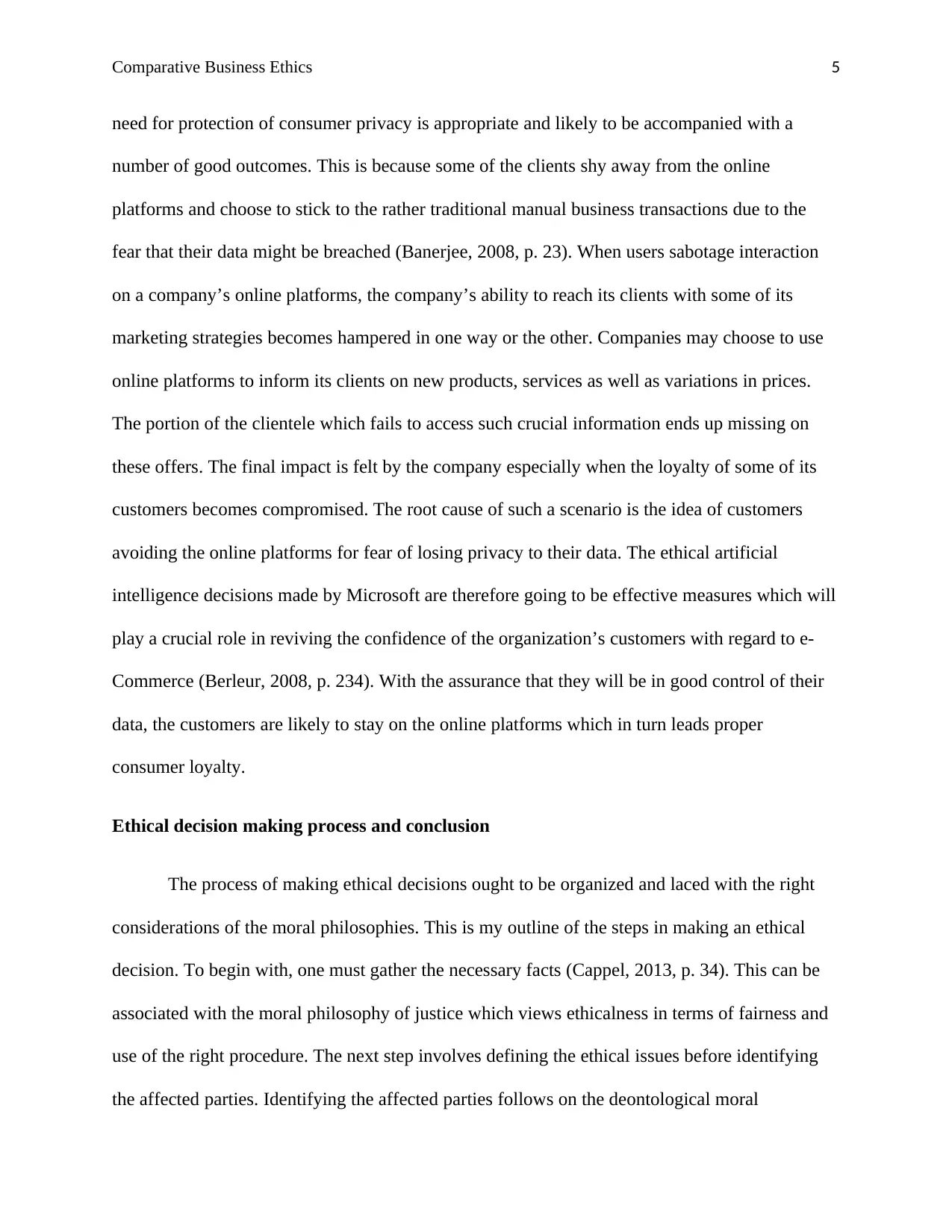
Comparative Business Ethics 5
need for protection of consumer privacy is appropriate and likely to be accompanied with a
number of good outcomes. This is because some of the clients shy away from the online
platforms and choose to stick to the rather traditional manual business transactions due to the
fear that their data might be breached (Banerjee, 2008, p. 23). When users sabotage interaction
on a company’s online platforms, the company’s ability to reach its clients with some of its
marketing strategies becomes hampered in one way or the other. Companies may choose to use
online platforms to inform its clients on new products, services as well as variations in prices.
The portion of the clientele which fails to access such crucial information ends up missing on
these offers. The final impact is felt by the company especially when the loyalty of some of its
customers becomes compromised. The root cause of such a scenario is the idea of customers
avoiding the online platforms for fear of losing privacy to their data. The ethical artificial
intelligence decisions made by Microsoft are therefore going to be effective measures which will
play a crucial role in reviving the confidence of the organization’s customers with regard to e-
Commerce (Berleur, 2008, p. 234). With the assurance that they will be in good control of their
data, the customers are likely to stay on the online platforms which in turn leads proper
consumer loyalty.
Ethical decision making process and conclusion
The process of making ethical decisions ought to be organized and laced with the right
considerations of the moral philosophies. This is my outline of the steps in making an ethical
decision. To begin with, one must gather the necessary facts (Cappel, 2013, p. 34). This can be
associated with the moral philosophy of justice which views ethicalness in terms of fairness and
use of the right procedure. The next step involves defining the ethical issues before identifying
the affected parties. Identifying the affected parties follows on the deontological moral
need for protection of consumer privacy is appropriate and likely to be accompanied with a
number of good outcomes. This is because some of the clients shy away from the online
platforms and choose to stick to the rather traditional manual business transactions due to the
fear that their data might be breached (Banerjee, 2008, p. 23). When users sabotage interaction
on a company’s online platforms, the company’s ability to reach its clients with some of its
marketing strategies becomes hampered in one way or the other. Companies may choose to use
online platforms to inform its clients on new products, services as well as variations in prices.
The portion of the clientele which fails to access such crucial information ends up missing on
these offers. The final impact is felt by the company especially when the loyalty of some of its
customers becomes compromised. The root cause of such a scenario is the idea of customers
avoiding the online platforms for fear of losing privacy to their data. The ethical artificial
intelligence decisions made by Microsoft are therefore going to be effective measures which will
play a crucial role in reviving the confidence of the organization’s customers with regard to e-
Commerce (Berleur, 2008, p. 234). With the assurance that they will be in good control of their
data, the customers are likely to stay on the online platforms which in turn leads proper
consumer loyalty.
Ethical decision making process and conclusion
The process of making ethical decisions ought to be organized and laced with the right
considerations of the moral philosophies. This is my outline of the steps in making an ethical
decision. To begin with, one must gather the necessary facts (Cappel, 2013, p. 34). This can be
associated with the moral philosophy of justice which views ethicalness in terms of fairness and
use of the right procedure. The next step involves defining the ethical issues before identifying
the affected parties. Identifying the affected parties follows on the deontological moral
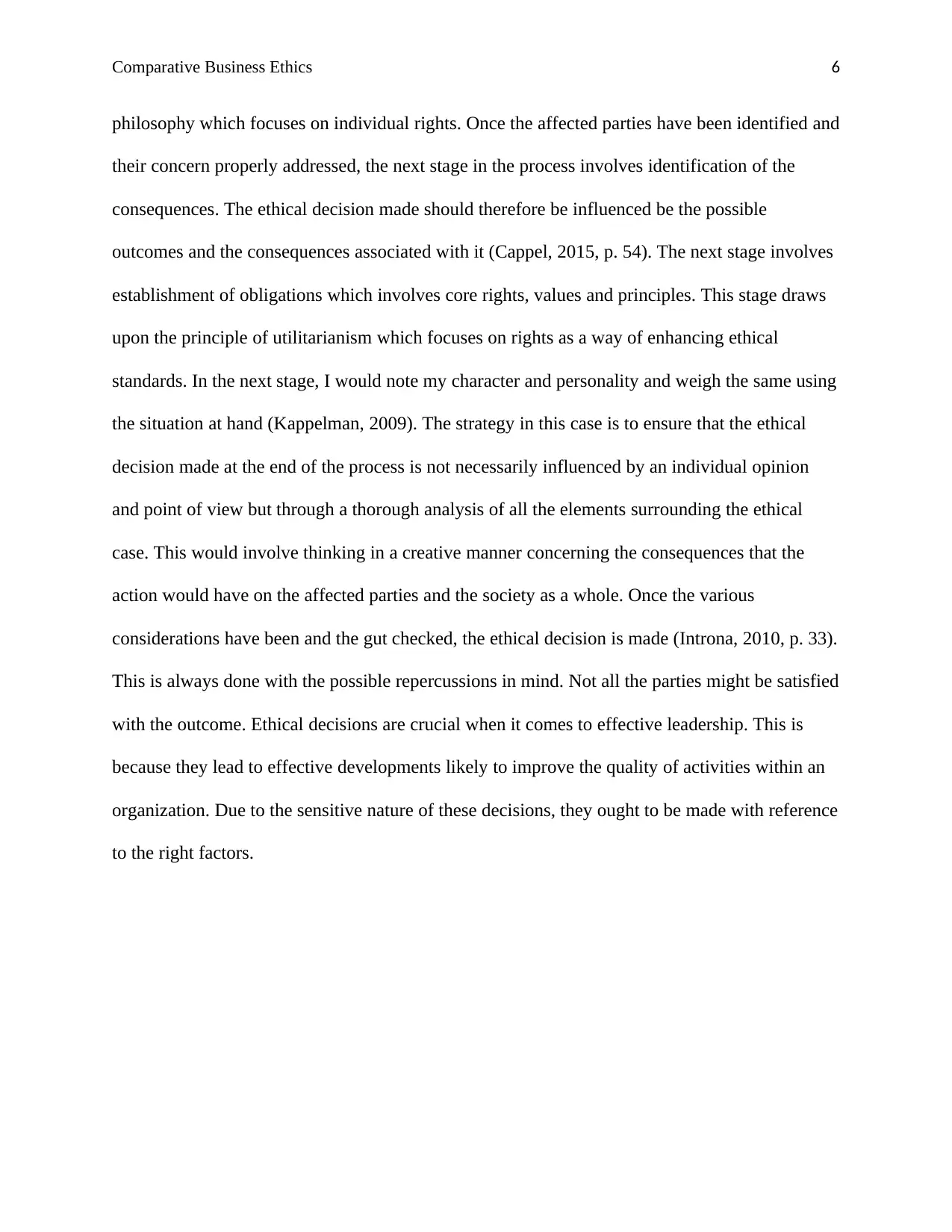
Comparative Business Ethics 6
philosophy which focuses on individual rights. Once the affected parties have been identified and
their concern properly addressed, the next stage in the process involves identification of the
consequences. The ethical decision made should therefore be influenced be the possible
outcomes and the consequences associated with it (Cappel, 2015, p. 54). The next stage involves
establishment of obligations which involves core rights, values and principles. This stage draws
upon the principle of utilitarianism which focuses on rights as a way of enhancing ethical
standards. In the next stage, I would note my character and personality and weigh the same using
the situation at hand (Kappelman, 2009). The strategy in this case is to ensure that the ethical
decision made at the end of the process is not necessarily influenced by an individual opinion
and point of view but through a thorough analysis of all the elements surrounding the ethical
case. This would involve thinking in a creative manner concerning the consequences that the
action would have on the affected parties and the society as a whole. Once the various
considerations have been and the gut checked, the ethical decision is made (Introna, 2010, p. 33).
This is always done with the possible repercussions in mind. Not all the parties might be satisfied
with the outcome. Ethical decisions are crucial when it comes to effective leadership. This is
because they lead to effective developments likely to improve the quality of activities within an
organization. Due to the sensitive nature of these decisions, they ought to be made with reference
to the right factors.
philosophy which focuses on individual rights. Once the affected parties have been identified and
their concern properly addressed, the next stage in the process involves identification of the
consequences. The ethical decision made should therefore be influenced be the possible
outcomes and the consequences associated with it (Cappel, 2015, p. 54). The next stage involves
establishment of obligations which involves core rights, values and principles. This stage draws
upon the principle of utilitarianism which focuses on rights as a way of enhancing ethical
standards. In the next stage, I would note my character and personality and weigh the same using
the situation at hand (Kappelman, 2009). The strategy in this case is to ensure that the ethical
decision made at the end of the process is not necessarily influenced by an individual opinion
and point of view but through a thorough analysis of all the elements surrounding the ethical
case. This would involve thinking in a creative manner concerning the consequences that the
action would have on the affected parties and the society as a whole. Once the various
considerations have been and the gut checked, the ethical decision is made (Introna, 2010, p. 33).
This is always done with the possible repercussions in mind. Not all the parties might be satisfied
with the outcome. Ethical decisions are crucial when it comes to effective leadership. This is
because they lead to effective developments likely to improve the quality of activities within an
organization. Due to the sensitive nature of these decisions, they ought to be made with reference
to the right factors.
⊘ This is a preview!⊘
Do you want full access?
Subscribe today to unlock all pages.

Trusted by 1+ million students worldwide
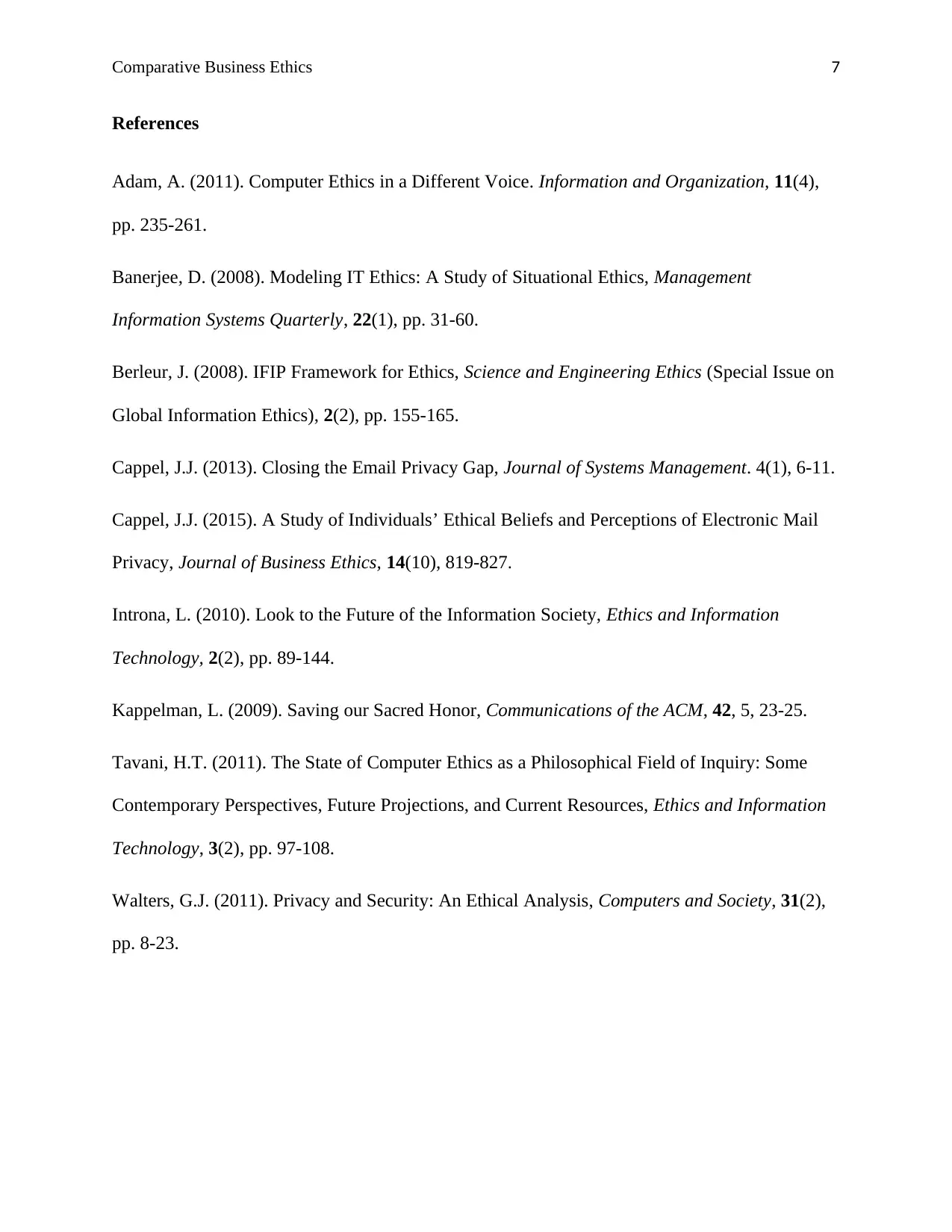
Comparative Business Ethics 7
References
Adam, A. (2011). Computer Ethics in a Different Voice. Information and Organization, 11(4),
pp. 235-261.
Banerjee, D. (2008). Modeling IT Ethics: A Study of Situational Ethics, Management
Information Systems Quarterly, 22(1), pp. 31-60.
Berleur, J. (2008). IFIP Framework for Ethics, Science and Engineering Ethics (Special Issue on
Global Information Ethics), 2(2), pp. 155-165.
Cappel, J.J. (2013). Closing the Email Privacy Gap, Journal of Systems Management. 4(1), 6-11.
Cappel, J.J. (2015). A Study of Individuals’ Ethical Beliefs and Perceptions of Electronic Mail
Privacy, Journal of Business Ethics, 14(10), 819-827.
Introna, L. (2010). Look to the Future of the Information Society, Ethics and Information
Technology, 2(2), pp. 89-144.
Kappelman, L. (2009). Saving our Sacred Honor, Communications of the ACM, 42, 5, 23-25.
Tavani, H.T. (2011). The State of Computer Ethics as a Philosophical Field of Inquiry: Some
Contemporary Perspectives, Future Projections, and Current Resources, Ethics and Information
Technology, 3(2), pp. 97-108.
Walters, G.J. (2011). Privacy and Security: An Ethical Analysis, Computers and Society, 31(2),
pp. 8-23.
References
Adam, A. (2011). Computer Ethics in a Different Voice. Information and Organization, 11(4),
pp. 235-261.
Banerjee, D. (2008). Modeling IT Ethics: A Study of Situational Ethics, Management
Information Systems Quarterly, 22(1), pp. 31-60.
Berleur, J. (2008). IFIP Framework for Ethics, Science and Engineering Ethics (Special Issue on
Global Information Ethics), 2(2), pp. 155-165.
Cappel, J.J. (2013). Closing the Email Privacy Gap, Journal of Systems Management. 4(1), 6-11.
Cappel, J.J. (2015). A Study of Individuals’ Ethical Beliefs and Perceptions of Electronic Mail
Privacy, Journal of Business Ethics, 14(10), 819-827.
Introna, L. (2010). Look to the Future of the Information Society, Ethics and Information
Technology, 2(2), pp. 89-144.
Kappelman, L. (2009). Saving our Sacred Honor, Communications of the ACM, 42, 5, 23-25.
Tavani, H.T. (2011). The State of Computer Ethics as a Philosophical Field of Inquiry: Some
Contemporary Perspectives, Future Projections, and Current Resources, Ethics and Information
Technology, 3(2), pp. 97-108.
Walters, G.J. (2011). Privacy and Security: An Ethical Analysis, Computers and Society, 31(2),
pp. 8-23.
Paraphrase This Document
Need a fresh take? Get an instant paraphrase of this document with our AI Paraphraser
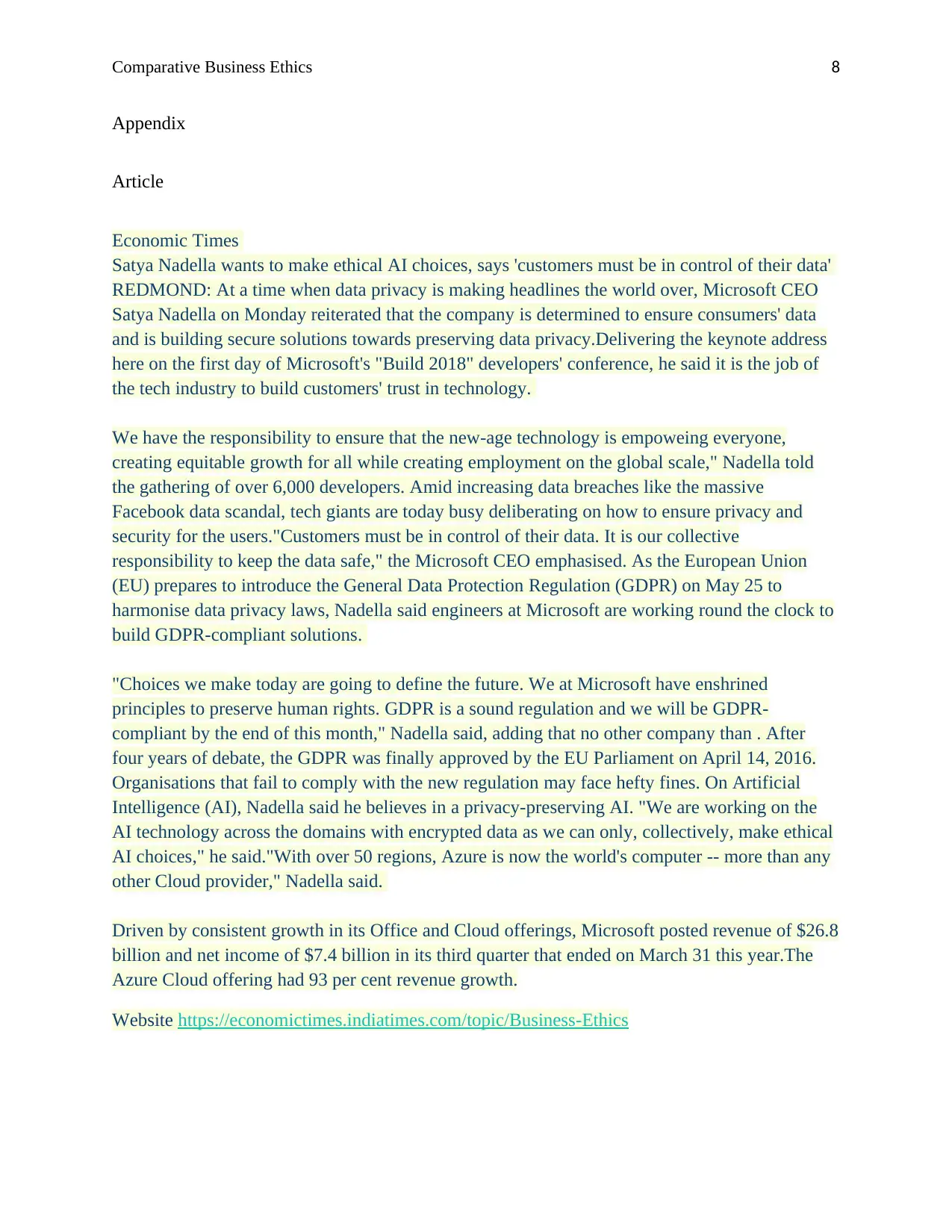
Comparative Business Ethics 8
Appendix
Article
Economic Times
Satya Nadella wants to make ethical AI choices, says 'customers must be in control of their data'
REDMOND: At a time when data privacy is making headlines the world over, Microsoft CEO
Satya Nadella on Monday reiterated that the company is determined to ensure consumers' data
and is building secure solutions towards preserving data privacy.Delivering the keynote address
here on the first day of Microsoft's "Build 2018" developers' conference, he said it is the job of
the tech industry to build customers' trust in technology.
We have the responsibility to ensure that the new-age technology is empoweing everyone,
creating equitable growth for all while creating employment on the global scale," Nadella told
the gathering of over 6,000 developers. Amid increasing data breaches like the massive
Facebook data scandal, tech giants are today busy deliberating on how to ensure privacy and
security for the users."Customers must be in control of their data. It is our collective
responsibility to keep the data safe," the Microsoft CEO emphasised. As the European Union
(EU) prepares to introduce the General Data Protection Regulation (GDPR) on May 25 to
harmonise data privacy laws, Nadella said engineers at Microsoft are working round the clock to
build GDPR-compliant solutions.
"Choices we make today are going to define the future. We at Microsoft have enshrined
principles to preserve human rights. GDPR is a sound regulation and we will be GDPR-
compliant by the end of this month," Nadella said, adding that no other company than . After
four years of debate, the GDPR was finally approved by the EU Parliament on April 14, 2016.
Organisations that fail to comply with the new regulation may face hefty fines. On Artificial
Intelligence (AI), Nadella said he believes in a privacy-preserving AI. "We are working on the
AI technology across the domains with encrypted data as we can only, collectively, make ethical
AI choices," he said."With over 50 regions, Azure is now the world's computer -- more than any
other Cloud provider," Nadella said.
Driven by consistent growth in its Office and Cloud offerings, Microsoft posted revenue of $26.8
billion and net income of $7.4 billion in its third quarter that ended on March 31 this year.The
Azure Cloud offering had 93 per cent revenue growth.
Website https://economictimes.indiatimes.com/topic/Business-Ethics
Appendix
Article
Economic Times
Satya Nadella wants to make ethical AI choices, says 'customers must be in control of their data'
REDMOND: At a time when data privacy is making headlines the world over, Microsoft CEO
Satya Nadella on Monday reiterated that the company is determined to ensure consumers' data
and is building secure solutions towards preserving data privacy.Delivering the keynote address
here on the first day of Microsoft's "Build 2018" developers' conference, he said it is the job of
the tech industry to build customers' trust in technology.
We have the responsibility to ensure that the new-age technology is empoweing everyone,
creating equitable growth for all while creating employment on the global scale," Nadella told
the gathering of over 6,000 developers. Amid increasing data breaches like the massive
Facebook data scandal, tech giants are today busy deliberating on how to ensure privacy and
security for the users."Customers must be in control of their data. It is our collective
responsibility to keep the data safe," the Microsoft CEO emphasised. As the European Union
(EU) prepares to introduce the General Data Protection Regulation (GDPR) on May 25 to
harmonise data privacy laws, Nadella said engineers at Microsoft are working round the clock to
build GDPR-compliant solutions.
"Choices we make today are going to define the future. We at Microsoft have enshrined
principles to preserve human rights. GDPR is a sound regulation and we will be GDPR-
compliant by the end of this month," Nadella said, adding that no other company than . After
four years of debate, the GDPR was finally approved by the EU Parliament on April 14, 2016.
Organisations that fail to comply with the new regulation may face hefty fines. On Artificial
Intelligence (AI), Nadella said he believes in a privacy-preserving AI. "We are working on the
AI technology across the domains with encrypted data as we can only, collectively, make ethical
AI choices," he said."With over 50 regions, Azure is now the world's computer -- more than any
other Cloud provider," Nadella said.
Driven by consistent growth in its Office and Cloud offerings, Microsoft posted revenue of $26.8
billion and net income of $7.4 billion in its third quarter that ended on March 31 this year.The
Azure Cloud offering had 93 per cent revenue growth.
Website https://economictimes.indiatimes.com/topic/Business-Ethics
1 out of 8
Related Documents
Your All-in-One AI-Powered Toolkit for Academic Success.
+13062052269
info@desklib.com
Available 24*7 on WhatsApp / Email
![[object Object]](/_next/static/media/star-bottom.7253800d.svg)
Unlock your academic potential
Copyright © 2020–2026 A2Z Services. All Rights Reserved. Developed and managed by ZUCOL.





